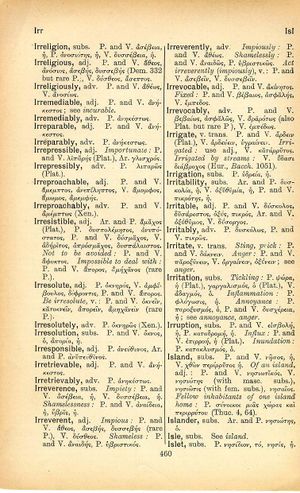irritate: Difference between revisions
From LSJ
Menander, Monostichoi, 501
(Gf-D_5) |
m (Text replacement - "}}]]" to "}}]]") |
||
| Line 1: | Line 1: | ||
{{Woodhouse1 | {{Woodhouse1 | ||
|Text=[[File:woodhouse_460.jpg|thumb | |Text=[[File:woodhouse_460.jpg|thumb | ||
|link={{filepath:woodhouse_460.jpg | |link={{filepath:woodhouse_460.jpg}}]]'''v. trans.''' | ||
<b class="b2">Sting, prick</b>: P. and V. δάκνειν. | <b class="b2">Sting, prick</b>: P. and V. δάκνειν. | ||
<b class="b2">Anger</b>: P. and V. παροξύνειν, V. ὀργαίνειν, ὀξύνειν; see [[anger]]. | <b class="b2">Anger</b>: P. and V. παροξύνειν, V. ὀργαίνειν, ὀξύνειν; see [[anger]]. | ||

